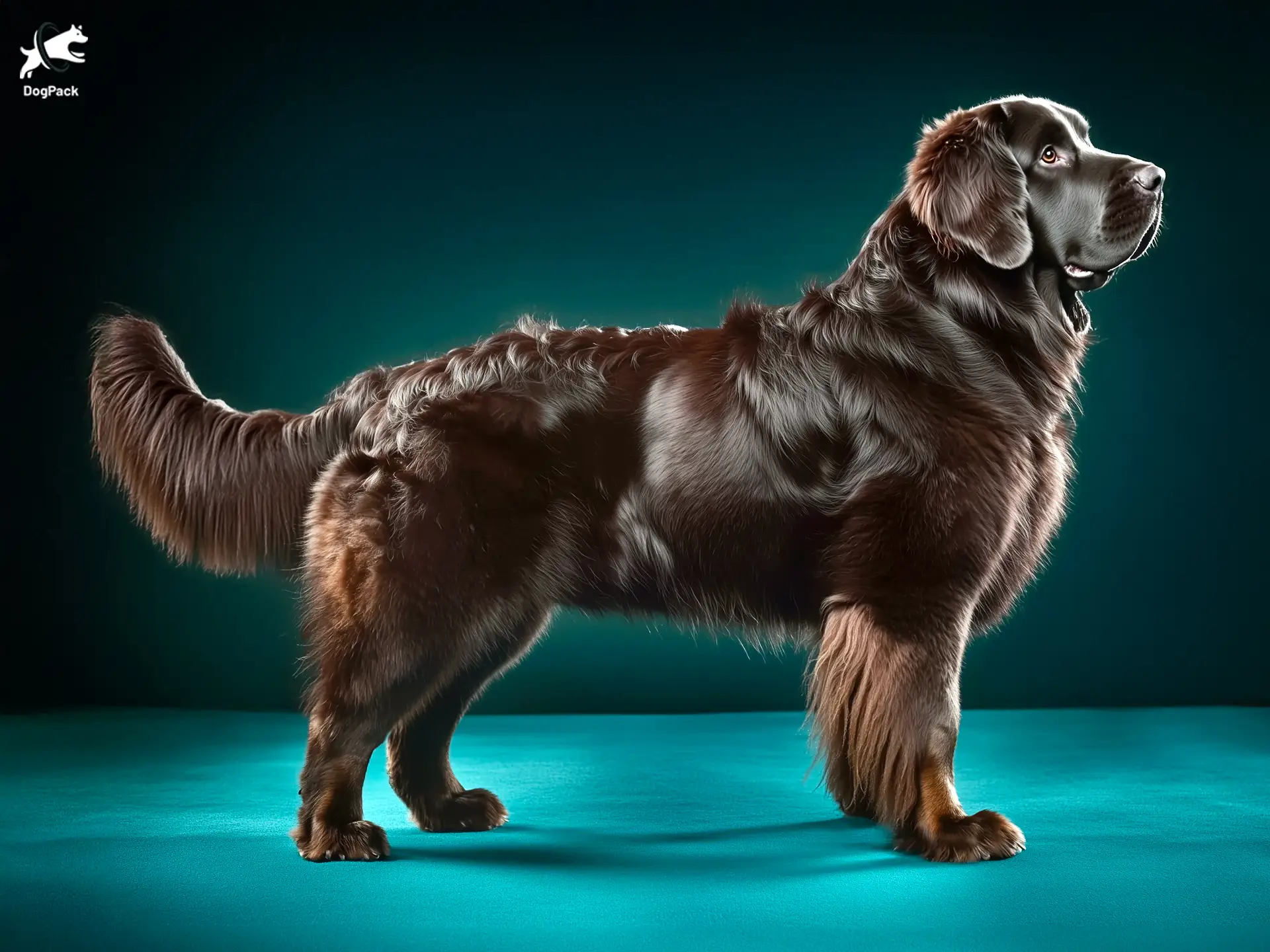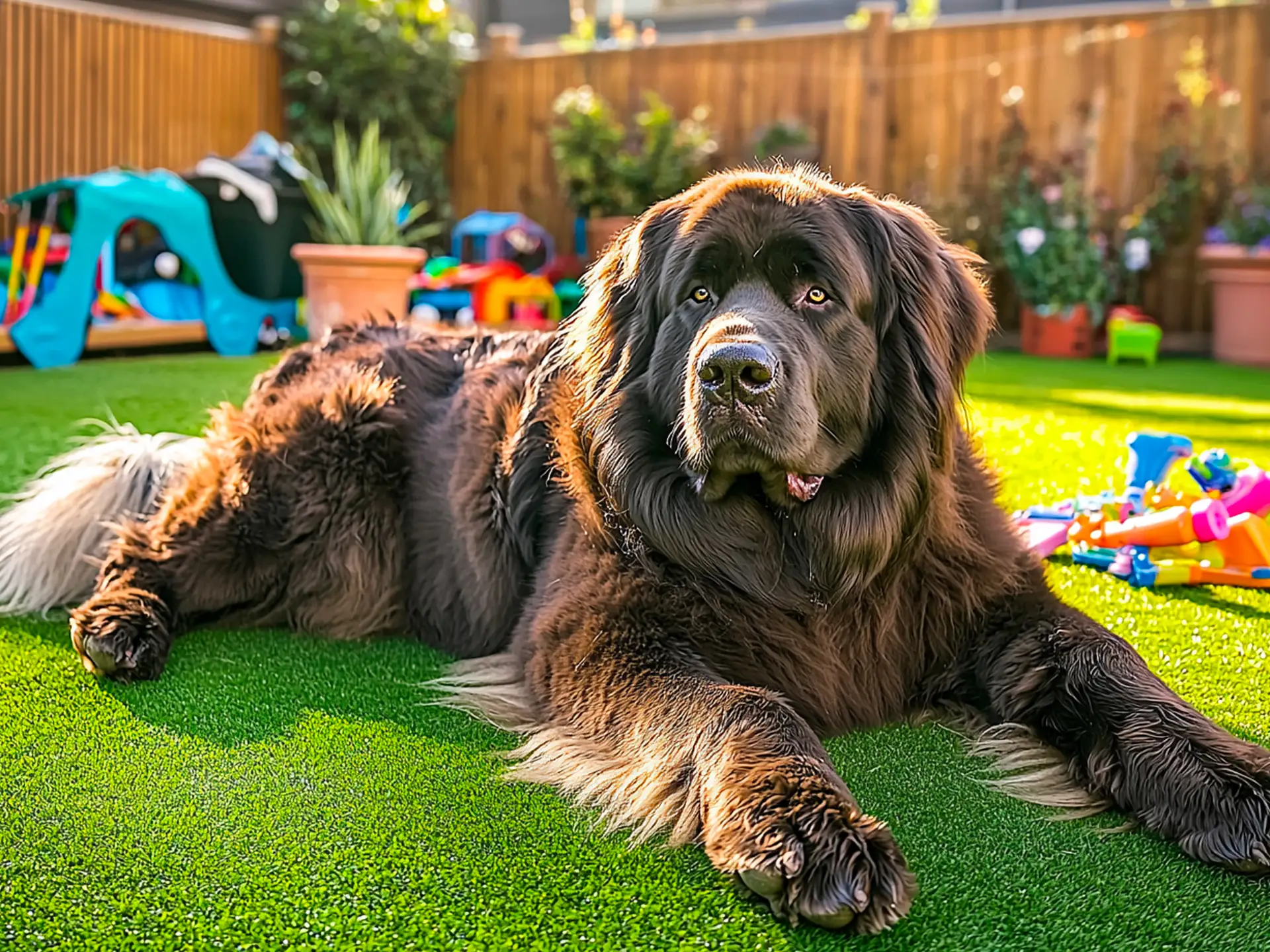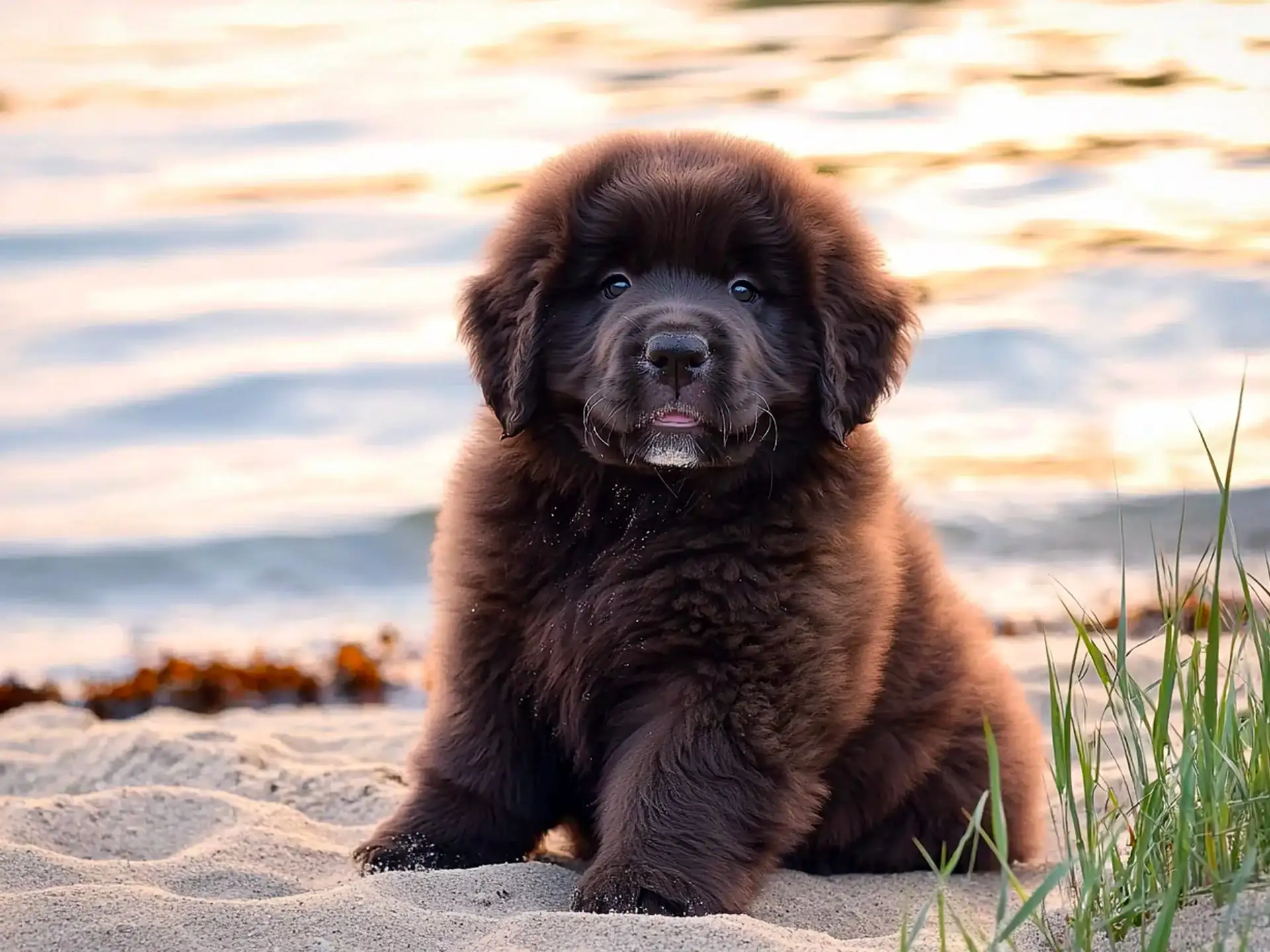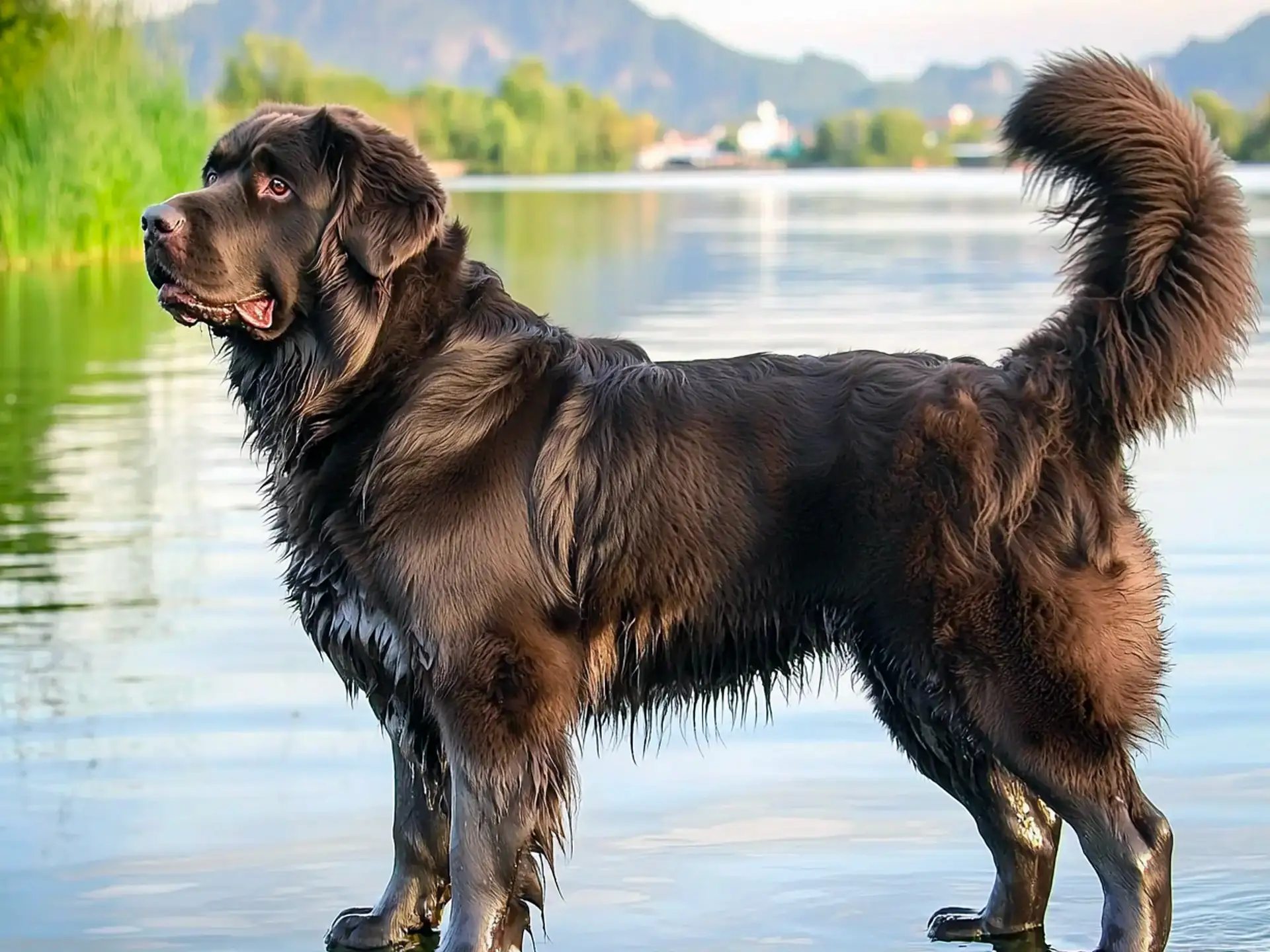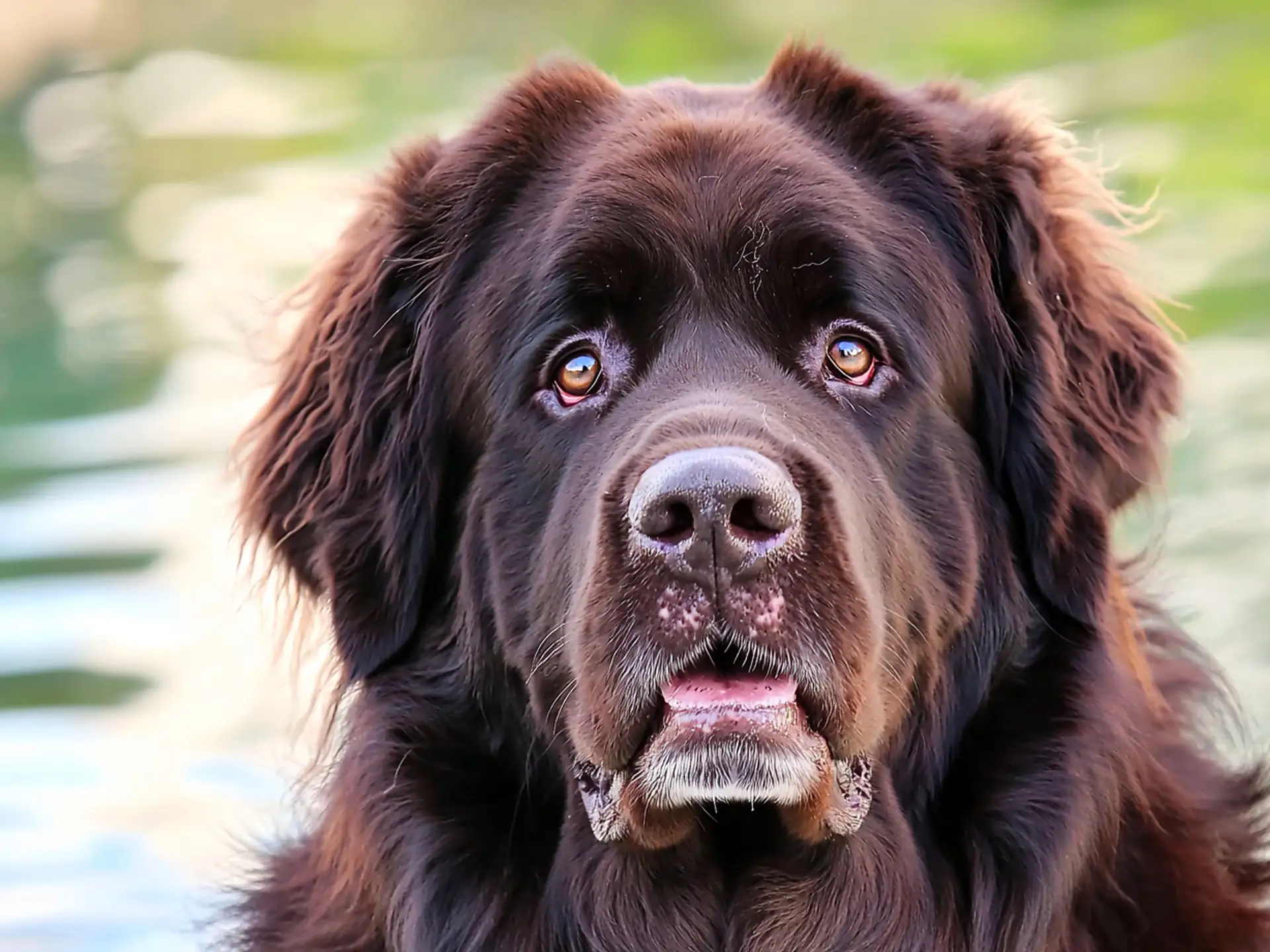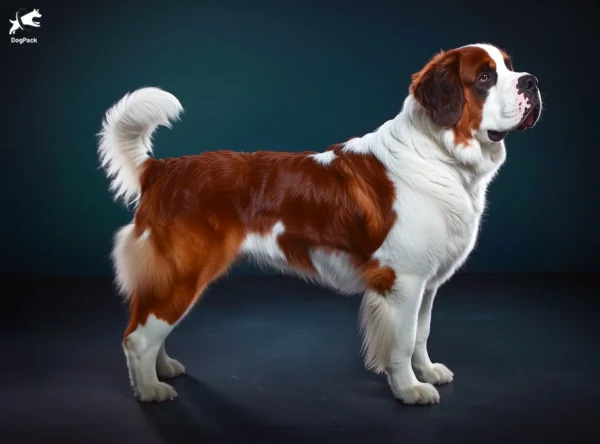Newfoundland Dog Breed Info & Overview
The Newfoundland, a gentle giant with a sweet temperament, is a breed renowned for its impressive size and exceptional swimming abilities. Known for their big hearts, Newfoundlands are loving and loyal companions, making them perfect for families and anyone seeking a devoted pet. With their calm nature and affection, they bring both strength and warmth to any home.
Characteristics
Pictures
Breed History
Did you know the Newfoundland was once the unsung hero of the fishing world? Originating from the rugged coasts of Newfoundland, Canada, these mighty dogs were prized for their strength and incredible swimming abilities. Fishermen relied on them to haul nets and even rescue people from icy waters—a lifesaving skill they excel at to this day.
In the 18th and 19th centuries, European fishermen took notice of the Newfoundland’s unique talents and brought them across the Atlantic. Their thick coats and webbed feet made them perfectly suited for cold-water work, cementing their reputation as one of the most reliable water dogs in history.
The breed takes its name from its place of origin, a nod to its vital role in the lives of Newfoundland’s seafarers. Over time, they’ve transformed from working dogs to beloved family companions, still carrying their legacy of loyalty and bravery.
Temperament, Personality
If there’s a canine equivalent of a teddy bear, the Newfoundland would take the crown. These gentle giants are famous for their calm, nurturing nature, earning them the nickname “nanny dogs.” They’re especially adored for their patience with children, making them ideal family pets.
When it comes to other animals, Newfoundlands are social butterflies. Their friendly disposition means they’re usually a hit with other pets, whether it’s the family cat or a fellow dog. They thrive in environments where they’re surrounded by companionship.
Strangers are greeted with warmth rather than suspicion—this breed isn’t known for aggression or guarding instincts. While their sheer size might deter intruders, a Newfoundland is more likely to offer a slobbery kiss than a growl.
Physical Characteristics
The Newfoundland is an unmistakable presence. Standing at 26–28 inches tall and weighing 100–150 pounds, they command attention with their massive, yet proportionate build. Despite their size, they move with surprising grace and elegance.
Their water-resistant double coat is one of their standout features. Thick and fluffy, it comes in stunning shades of black, brown, gray, or a black-and-white combination known as “Landseer.” This luxurious coat isn’t just for looks—it protects them in freezing waters.
Other distinctive traits include their webbed feet, which make them unparalleled swimmers, and their soulful, expressive eyes. Combine that with their broad chest and strong legs, and you have a dog that’s both powerful and endearingly huggable.
Health Issues
Like all large dog breeds, Newfoundlands are prone to specific health concerns. Hip and elbow dysplasia are common, potentially leading to mobility issues as they age. Regular check-ups and weight management can help mitigate these risks.
Subvalvular aortic stenosis (SAS), a hereditary heart condition, is another issue to watch for. Early detection through routine veterinary visits is crucial for managing this potentially life-threatening problem.
Obesity can exacerbate many of these conditions, so maintaining a balanced diet and regular exercise is essential. Reputable breeders often screen for genetic issues, providing peace of mind for prospective owners.
Grooming Needs
Owning a Newfoundland comes with a fair share of grooming responsibilities. Their thick double coat needs brushing at least two to three times a week to prevent tangles and reduce shedding. During spring and fall, when shedding increases, daily brushing is a must.
While their coat naturally repels water, occasional baths help keep it clean and smelling fresh—especially after a romp in the mud or a swim. Use a gentle dog shampoo to preserve their coat’s natural oils.
Don’t overlook nail trims, ear cleaning, and dental care. Their floppy ears can trap moisture, increasing the risk of infections. Regular maintenance ensures your Newfoundland stays as healthy as they are stunning.
Exercise Requirements
Despite their size, Newfoundlands aren’t high-energy dogs. They’re happiest with moderate daily exercise, such as a long walk or a good swim—water is their element, after all! About an hour of activity each day should suffice to keep them fit.
Swimming isn’t just a pastime; it’s a passion for Newfoundlands. Their webbed feet and powerful build make them natural-born water lovers. If you live near a lake or beach, prepare for your dog to dive right in.
While they enjoy playtime, they’re not fans of overexertion, especially in warm weather. Always monitor their activity to prevent overheating, and provide plenty of shade and water during outdoor adventures.
Training Tips
Training a Newfoundland is a rewarding experience, thanks to their intelligence and eagerness to please. Start early to instill good habits—after all, a well-behaved 150-pound dog is far easier to manage than one who’s never learned basic manners.
Positive reinforcement is key. Treats, praise, and gentle encouragement go a long way with this sensitive breed. Harsh training methods are unnecessary and can damage their trust.
Socialization is equally important. Expose your Newfoundland to a variety of environments, people, and pets during puppyhood to ensure they grow into a confident and adaptable adult. And don’t forget leash training—it’s crucial when handling a dog of their size!
Nutrition, Diet
Feeding a Newfoundland is all about balance. Their size and active lifestyle require a diet rich in high-quality protein to support muscle development and overall health. Opt for large-breed-specific formulas to meet their unique nutritional needs.
Adult Newfoundlands typically eat 4–5 cups of dry food daily, split into two meals to reduce the risk of bloat. Portion control is essential, as this breed is prone to obesity, which can exacerbate joint and heart issues.
Supplements like glucosamine and omega-3 fatty acids can support joint health and keep their coat glossy. Always consult your veterinarian for a tailored feeding plan based on your dog’s age, activity level, and health.
Adoption, Breeders
Interested in welcoming a Newfoundland into your life? Start with breed-specific rescues like National Newfoundland Rescue, where dogs in need of homes await loving families.
If you prefer a puppy, work with reputable breeders who conduct health screenings for conditions like SAS and hip dysplasia. The Newfoundland Club of America is an excellent resource for finding ethical breeders.
Avoid puppy mills or pet stores that prioritize profit over health and temperament. A responsible breeder will provide detailed information about the puppy’s lineage and care needs, ensuring a happy start for your new family member.
Family Pet?
Newfoundlands are the ultimate family dogs. Their calm, patient nature makes them perfect companions for children, earning them a well-deserved reputation as “nanny dogs.” They’re protective without being aggressive, offering a sense of security to the whole family.
Their social demeanor extends to other pets as well, making them a great addition to multi-pet households. With proper training and supervision, they’ll fit seamlessly into your home.
However, their large size means they need plenty of space to move around. While they adapt well to indoor living, a big yard or frequent trips to open spaces will keep them content.
Right For You?
If you have the space, time, and love for a large, gentle companion, the Newfoundland might be your perfect match. They thrive in homes where they can be part of the family and enjoy regular exercise and grooming.
Their size and grooming needs mean they’re not for everyone. If you’re unprepared for the commitment, this breed might feel overwhelming. However, for those ready to embrace the challenge, the reward is an incredibly loyal and loving companion.
Carefully consider your lifestyle, and if it aligns with their needs, you’ll find a Newfoundland to be a wonderful addition to your life.
Conclusion
The Newfoundland is more than just a dog; they’re a gentle, loyal companion with a heart as big as their stature. Whether rescuing lives in icy waters or cuddling on the couch, they bring love and devotion to every moment. If you’re ready to welcome this giant sweetheart into your family, prepare for a lifetime of loyalty, affection, and unforgettable memories.
FAQs
-
Why were Newfoundlands historically used for water rescues?
Newfoundlands were bred for water rescues because of their webbed feet, powerful swimming ability, and natural buoyancy. Their thick, water-resistant coat also protects them from cold water, making them ideal lifesaving dogs.
-
How do Newfoundlands communicate their needs?
Newfoundlands often use gentle nudges, soft vocalizations, or body language to express their needs. They are intuitive and can communicate well without excessive barking, making them easy to understand for attentive owners.
-
Can Newfoundlands live with other large dogs?
Yes, Newfoundlands generally get along well with other large dogs due to their friendly and sociable nature. Proper introductions and training help foster harmony, even in multi-dog households.
-
How do Newfoundlands perform in cold-water sports?
Newfoundlands excel in cold-water sports like dock diving and water trials, thanks to their endurance and swimming skills. These activities allow them to channel their natural abilities while staying active and engaged.
-
Do Newfoundlands need professional grooming?
Yes, professional grooming every 6–8 weeks helps maintain their dense double coat. This reduces matting, shedding, and skin issues while keeping them comfortable. Regular at-home brushing complements these sessions.
Breed Ratings
Newfoundlands are smart and learn quickly, especially with consistent, positive training methods.
They enjoy playtime but are generally laid-back, preferring gentle activities over high-energy games.
Moderate energy levels mean they need regular exercise but are not hyperactive.
High shedding due to their thick coat; regular grooming is essential to manage hair at home.
Low prey drive makes them less likely to chase smaller animals, which is great for multi-pet households.
Their heavy coat requires frequent grooming sessions, making them higher maintenance.
Eager to please and intelligent, they respond well to positive reinforcement training methods.
They prefer companionship and may experience separation anxiety if left alone too long.
Generally quiet, they don’t bark excessively but will alert you if something’s amiss.
High drooling is common; be prepared for slobber, especially after meals.
Highly sociable with other dogs; they enjoy canine company and are non-aggressive.
Prone to certain health issues; regular vet care and responsible breeding can mitigate risks.

